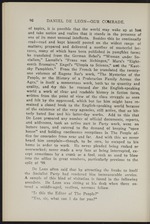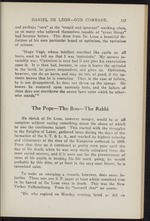| 1 |
 |
“...topics, it is possible that the world may wake up at last
and take notice and realize that it stands in the presence of
one of its most unusual intellects. Besides -this he continually
readread and kept himself posted on the widest range of
matters; prepared and delivered a nunrfber of masterful lec-
tures, many of which have been published in pamphlet form;
he translated from the German Bebels Woman under So-
cialism, Lassalles Franz von Sickingen, Marxs Eight-
eenth Brumaire, Engels Utopia to Science, artd the Kaut-
sky Pamphlets. From the French he translated the twenty-
one volumes of Eugene Sues work, The Mysteries of the
People, or the History of a Proletarian Family Across the
Ages, in itself a momentous work, both as to quantity and
quality, and
|
|
| 2 |
 |
“...DANIEL DE LEONOUR COMRADE. 117
and perhaps sore at the stupid and ignorant working^ clasSy
as so many who believed themselves capable of great things"
had become before. This drew from De Leon a beautiful de-
finition of his own particular brand of optimism, the optimism
of science;
Hugo Vogt, whose intellect marched like cattle on alf
fours, used to tell me that I was optimistic. My answer m-
variably was: Optimism is very bad if one pins his expectatiom
upon it. It is then bad, because, in case it leaves the optimist
in the lurch, he grows despondent, and gives up. Optimisi^,
however, can do no harm, and may do lots of good, if the op-
timist knows that he is venturing. Then in the case of failure,
he is not disappointed, he does not throw up the sponge. He
knows he ventured upon unsteady facts, and the failure of
these does not overthrow the sound facts upon which he other-
wise stands,'
The PopeThe BossThe Rabbi
No sketch of De Leon, however meager, would be at aK
complete without saying...”
|
|
